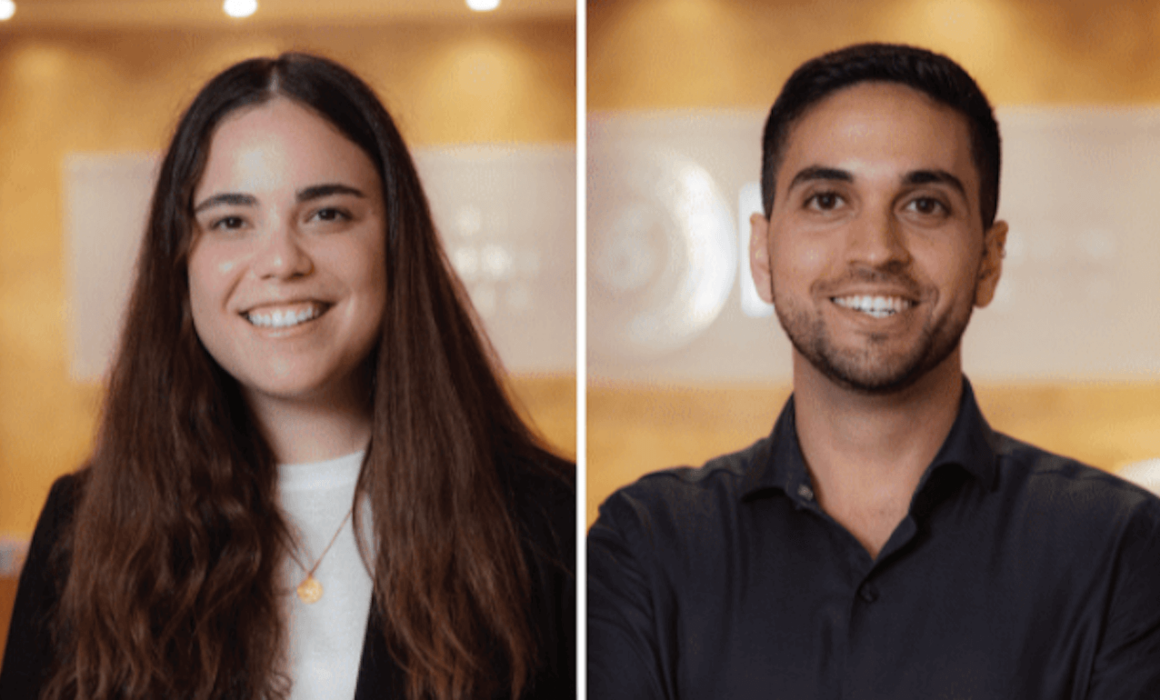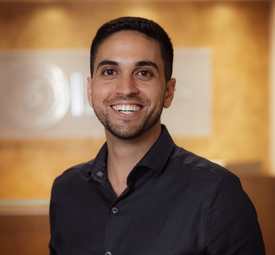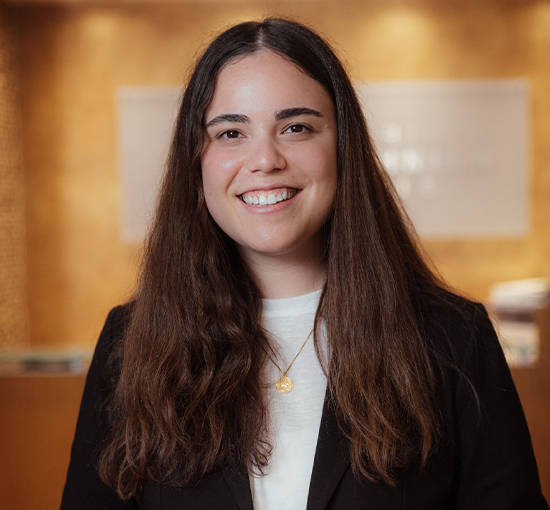Maya Goldshlager served the Israeli Air Force with distinction, providing instruction on operating the Iron Dome defense system. Her contribution felt so meaningful, she said, “it led me to choose a degree that would combine science and technology to impact people’s lives.”
As an undergraduate in the Faculty of Biomedical Engineering at the Technion, Ms. Goldshlager is already making waves.
Participating in her faculty’s hackathon, a competition to find solutions to real-life problems, Ms. Goldshlager created prototypes of two new medical tools: one to treat multiple sclerosis (MS) and the other for urinary tract infections (UTIs). “It was a great experience,” she said, from the earliest stages of brainstorming with other students to research and then creation. “I had the chance to come up with a solution to major health challenge problems we see every day.”
Ms. Goldshlager was one of eight Ilene & Steve Berger Technion Visiting Fellows to meet with American Technion Society (ATS) supporters in the U.S. this past year. Selected for their academic excellence and well-rounded personalities, these students are the soul of the Technion and the future of Israel.
Born in Tel Aviv, Ms. Goldshlager graduated high school with an excellency diploma while simultaneously studying physics at a special science education center. She was active in the scouting movement, which is an integral part of Israeli society — first as a member, then as an instructor, and finally as head of the instructors. On deciding to pursue biomedical engineering, she said, “It was crystal clear to me that I was going to learn at the Technion. It’s the best institute in Israel, and it motivates me every day to give 100%.”
Specializing in signal analysis and biomechanics and fluids, Ms. Goldshlager is currently focused on a project that diagnoses dementia in elderly people based on the sound of their voice. She and her team gather datasets from patients at nearby Rambam Hospital for analysis, then build algorithms that detect dementia symptoms. “The initial diagnosis of dementia is very important because the patient can receive better treatment if the disease is found in the early stages. This is a small, first step,” Ms. Goldshlager said, but she hopes to continue the research and eventually create a generic tool that benefits patients and doctors.
When she’s not in the lab, Ms. Goldshlager works in the David and Janet Polak Visitor Center at the Technion and mentors biomedical students who are struggling to acclimate to their first year. She also takes dance classes and uses the Technion’s recreational facilities to jog, swim, and recharge.
It has not always been easy being a woman in STEM. But the Technion gets high marks, as more than 48% of incoming students are women. “The Technion gives all students an opportunity to become the best they can be regardless of their gender or where they are coming from,” Ms. Goldshlager explained.
One such student is Aviram Avital ’18, M.S. ’20, the first in his family to pursue higher education. His parents immigrated to Israel from Morocco, settling in the “periphery” town of Kiryat Bialik. His father dropped out of high school at the age of 15 and worked as a car mechanic, while his mother was a bank teller.
Mr. Avital too might have missed out on an education had it not been for the generosity of ATS supporters. “When I was an undergraduate student, my mom couldn’t pay my tuition, and I needed to get involved back home to help financially,” Mr. Avital said while touring in New York as a Berger Fellow. “One of the reasons I’m here is to thank ATS donors, to make sure that future generations of students with financial difficulties can get the same help I did.”
Today, he is pursuing both a doctorate in the Wolfson Department of Chemical Engineering and a Technion MBA. Working with Associate Professor Avi Schroeder in the Louis Family Laboratory for Targeted Drug Delivery & Personalized Medicine, Mr. Avital’s research repurposes nanoscale drug delivery systems developed for cancer to combat viral diseases in agriculture. Likening his work to aerospace, he offers this analogy: “Astronauts have a mission in space but need a proper spaceship to get there. I develop the spaceship for biological molecules to penetrate the plant, distribute within it, and reach the infected cells to fight the virus without harming the plant itself.”
Such solutions do not currently exist, and farmers regularly face huge economic losses. “When we look at the climate crisis, we see that food shortages will be a big problem for humankind,” he said. “Our delivery system can increase crop yield and help ensure food security.”
Mr. Avital served in the Israel Defense Forces’ Armored Corps, reaching the rank of first sergeant, and remains in active reserve duty. Like Ms. Goldshlager, he set his sights on the Technion “because I wanted to become an engineer and have an impact on the world,” he said. “What better place is there to learn engineering than the Technion?”
He made the Dean’s List throughout his undergraduate years and received numerous awards and scholarships. In finding work-life balance, Mr. Avital carves out time to travel, hike, and watch professional basketball. He is a role model for students at his hometown high school, where he often returns to speak about the importance of an academic education.
Though his career is still young, Mr. Avital’s research is gaining traction. Local Israeli wineries are interested in his technology, and he and a team of scientists are awaiting approval on a U.S. patent application in the field of nanoparticles and agriculture. “You can have amazing science, but what does it accomplish if you can’t apply it?” he said. “We are doing science that we can take to industry, implement quickly in real life, and help growers around the world.”
Looking ahead, Mr. Avital hopes to lead a biotech company in Israel.


